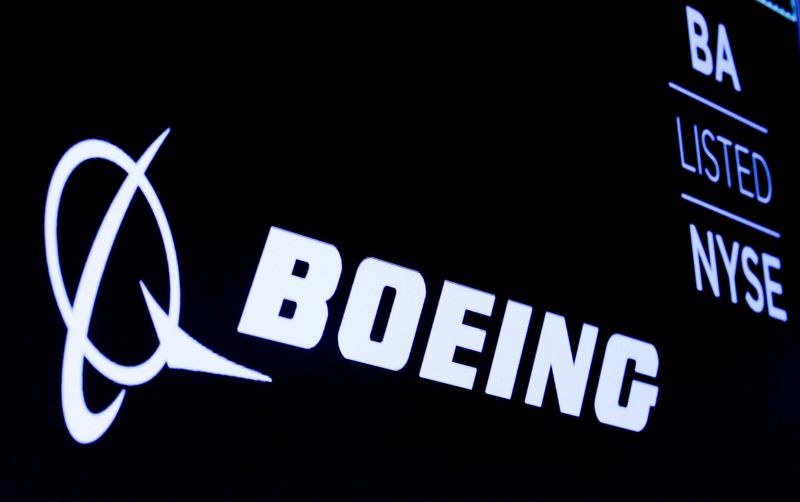Investing.com — Boeing’s (NYSE:) efforts to stabilize its financial position amid challenging market conditions have intensified following a recent stock raise, but analysts at Wells Fargo suggest the asset sale could provide crucial support to its balance sheet of the company.
Currently, Boeing’s credit rating is just above high-yield status, with a negative outlook from the major rating agencies, indicating that substantial improvements are needed to maintain investment-grade status through 2027.
Wells Fargo notes that Boeing’s debt load, interest coverage and cash flow-to-debt ratios are well below standards for investment-grade companies.
While the recent capital injection resulting from the capital raise may prevent an immediate credit rating downgrade, Boeing still faces continued pressure to address its significant debt burden and limited cash flow.
Boeing has about $16.5 billion in debt maturing in 2027, with a current blended interest rate of 3.5%.
If Boeing were forced to refinance this debt at high interest rates, Wells Fargo estimates that additional interest costs could amount to approximately $600 million over the next three years, with $100 million in additional interest in 2025, rising to $300-400 million by 2026. before being phased out in 2027.
While the capital increase provides some relief, further improvements are necessary to enable Boeing to manage or pay down these debts without incurring these higher costs.
Any further production or operational disruption could hamper Boeing’s ability to service these debts, increasing financial pressure.
In light of these challenges, Wells Fargo suggests that asset sales could help Boeing accelerate its financial recovery, potentially pushing back the timeline for improving credit metrics by about a year.
Specifically, analysts identify several segments that could be suitable for divestiture, including Boeing’s aerospace business, Jeppesen (a provider of aviation data and planning services), and parts of its KLX and Aviall distribution businesses.
Together, these assets could generate returns in the billions of dollars, while having limited impact on Boeing’s annual free cash flow.
For example, the sale of these units could result in a cash flow reduction of less than $500 million per year, a trade-off that Wells Fargo sees as favorable if it helps speed Boeing’s path to financial stability.
The aerospace segment, including Boeing’s stake in United Launch Alliance (ULA), could be particularly attractive to buyers within the defense industry.
According to Wells Fargo, this segment contributes roughly $2 billion to $3 billion in revenue but operates at low or negative margins, which could make a divestiture less painful for Boeing’s overall profitability.
Jeppesen, a services company that Boeing acquired in 2000, could also be valued at about $3 billion based on industry comparisons and its expanded workforce since the acquisition.
Similarly, Boeing’s KLX and Aviall businesses, which focus primarily on parts distribution, may no longer align with the company’s core strategy, especially for non-Boeing aircraft support, and could be sold to to free up additional capital.
Together, these divestitures would allow Boeing to shift its focus to its core businesses of commercial aircraft production and defense.
While these asset sales appear promising, they come with challenges. Limited disclosure across each segment makes accurate valuation difficult, and Boeing could face tax implications that could reduce net revenues.
Additionally, the aerospace giant must balance divestments with its ongoing operational demands.
Wells Fargo cautions that these transactions must be carefully managed to avoid destabilizing core businesses, especially as Boeing faces additional risks such as technical and regulatory challenges related to its key aircraft models, ongoing labor negotiations and integration hurdles with acquired entities.
These factors could all affect Boeing’s cash flow and ability to meet its debt obligations.
Despite these potential complications, Wells Fargo estimates that if Boeing can effectively execute its divestiture strategy, the timeline for recovering its credit ratings could be shortened.
Achieving investment-grade grades by 2026, rather than the current projection of 2027, would provide a critical cushion against downgrades and allow Boeing to maintain more favorable capital costs. This could not only reduce interest costs on future debt, but also make Boeing stock more attractive to institutional investors.
Wells Fargo’s conservative view of Boeing is clearly reflected in its revised price target of $85 per share, lower than previous estimates and well below the current market price.
This target reflects analysts’ assessment that Boeing’s near-term upside is limited by ongoing financial and operational challenges.
While asset sales could improve Boeing’s financial position, the benefits largely depend on Boeing’s ability to execute these sales efficiently and manage proceeds to reduce debt without harming essential functions.


